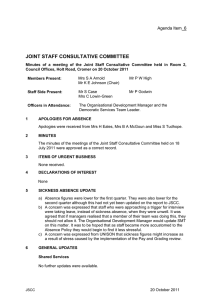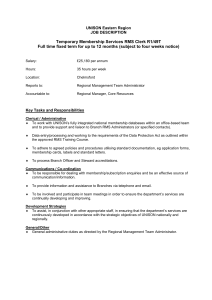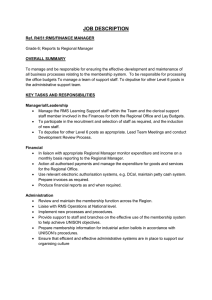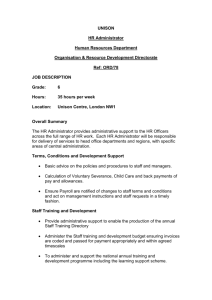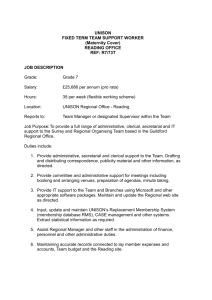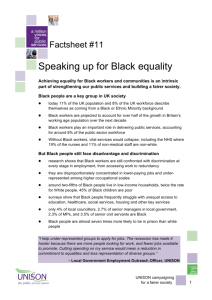JOINT STAFF CONSULTATIVE COMMITTEE Agenda Item 6
advertisement
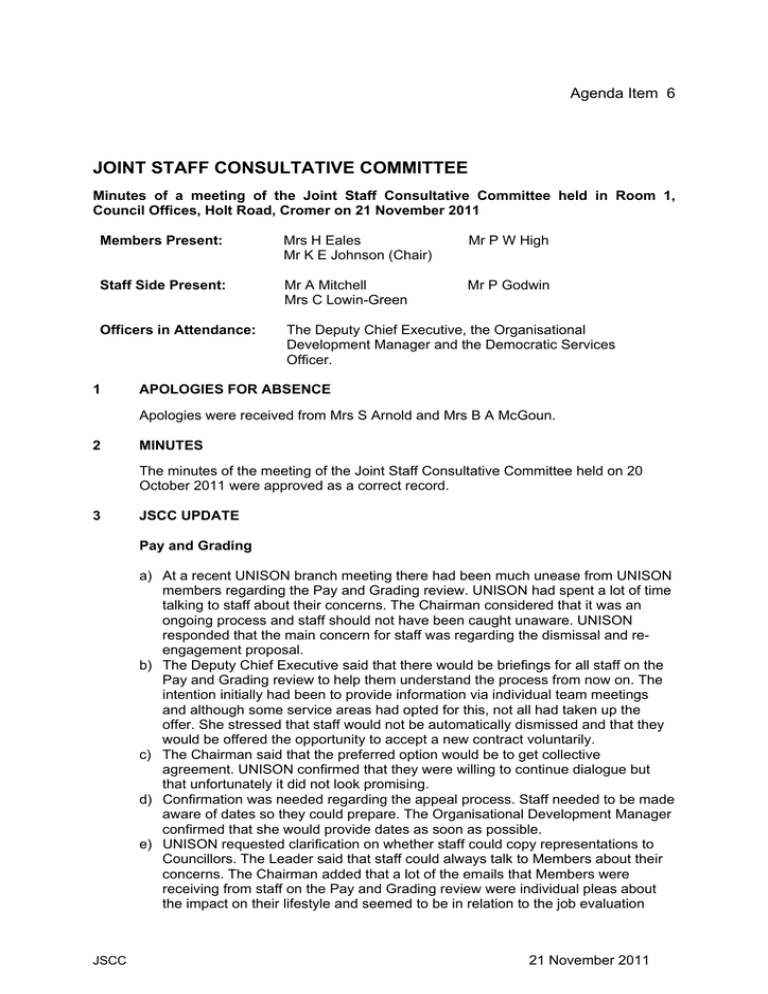
Agenda Item 6 JOINT STAFF CONSULTATIVE COMMITTEE Minutes of a meeting of the Joint Staff Consultative Committee held in Room 1, Council Offices, Holt Road, Cromer on 21 November 2011 Members Present: Mrs H Eales Mr K E Johnson (Chair) Mr P W High Staff Side Present: Mr A Mitchell Mrs C Lowin-Green Mr P Godwin Officers in Attendance: The Deputy Chief Executive, the Organisational Development Manager and the Democratic Services Officer. 1 APOLOGIES FOR ABSENCE Apologies were received from Mrs S Arnold and Mrs B A McGoun. 2 MINUTES The minutes of the meeting of the Joint Staff Consultative Committee held on 20 October 2011 were approved as a correct record. 3 JSCC UPDATE Pay and Grading a) At a recent UNISON branch meeting there had been much unease from UNISON members regarding the Pay and Grading review. UNISON had spent a lot of time talking to staff about their concerns. The Chairman considered that it was an ongoing process and staff should not have been caught unaware. UNISON responded that the main concern for staff was regarding the dismissal and reengagement proposal. b) The Deputy Chief Executive said that there would be briefings for all staff on the Pay and Grading review to help them understand the process from now on. The intention initially had been to provide information via individual team meetings and although some service areas had opted for this, not all had taken up the offer. She stressed that staff would not be automatically dismissed and that they would be offered the opportunity to accept a new contract voluntarily. c) The Chairman said that the preferred option would be to get collective agreement. UNISON confirmed that they were willing to continue dialogue but that unfortunately it did not look promising. d) Confirmation was needed regarding the appeal process. Staff needed to be made aware of dates so they could prepare. The Organisational Development Manager confirmed that she would provide dates as soon as possible. e) UNISON requested clarification on whether staff could copy representations to Councillors. The Leader said that staff could always talk to Members about their concerns. The Chairman added that a lot of the emails that Members were receiving from staff on the Pay and Grading review were individual pleas about the impact on their lifestyle and seemed to be in relation to the job evaluation JSCC 21 November 2011 scores. The Deputy Chief Executive pointed out that any concerns over the evaluation scores would be dealt with via the appeals process and that some of the emails sent could constitute lobbying. She agreed to take advice on whether correspondence relating to the new pay model was acceptable. The Organisational Development Manager reminded everyone that all correspondence relating to the Pay and Grading review would be made available to staff and Members at the end of the consultation period. Names and details would be redacted to ensure anonymity. It was agreed that UNISON would take this back to the Branch Committee to discuss. They may then give further advice that correspondence to Members relating to the new pay model and the process was acceptable. Discretionary Payments Scheme A report on the Discretionary Payments Scheme was being presented to Cabinet on 28 November. UNISON pointed out that previously such items had come to JSCC before Cabinet so that they could make comments before decisions were made. This was outlined in the Terms of Reference for the Committee. The Deputy Chief Executive explained that this particular item was a matter for the Council and that it did not have to come to JSCC but nevertheless that it was appropriate to discuss it at the meeting. The Chairman agreed to take the item as urgent business. 4 ITEMS OF URGENT BUSINESS Discretionary Payments Scheme a) UNISON had concerns regarding the recommendation to reduce the multiplier for compulsory redundancies from 2.2 to 1.5 and felt that further information should be provided for the reasons behind the reduction. They welcomed the increase in the discretionary payments for voluntary redundancies. The Organisational Development Manager said that the current policy was introduced in 2009 and the Council was obliged to review it regularly. Other Councils were also reducing their multipliers. b) UNISON suggested that the Council should review the Discretionary Payments for those made compulsorily redundant. The latter was the worst possible situation for most people and this should be taken into account. The Organisational Development Manager said that the Council were still intending to use actual weekly pay rather than using weekly pay up to the statutory minimum when calculating payments. UNISON welcomed this. The Chairman added that there were other options within the report that would also be considered. c) UNISON pointed out that the timing of these changes was unfortunate as they coincided with the culmination of the Pay and Grading review and the Management Re-structure and that staff would view it purely as a further cost saving. The Organisational Development Manager responded that there would never be a good time to introduce such changes. d) It was acknowledged that staff working in the teams that were being considered for shared services with other local authorities were going through a period of particular uncertainty and these changes may give them further concern since discretionary payments in other authorities may be better, thereby placing NNDC staff at a disadvantage. It was agreed that they should be offered additional support if necessary. e) UNISON confirmed that they would make a formal written response to the proposals before the Cabinet meeting on 28 November JSCC 21 November 2011 Industrial Action a) There was planned industrial action for 30 November 2011. UNISON explained that it was a national event and any picketing would of course be peaceful. b) The Organisational Development Manager confirmed that she had raised the issue with UNISON about picketing. Some staff had concerns about accessing the building. It was suggested that UNISON should picket at the main doors to the Council offices but not at the bottom door as this was not a public entrance and was on private property. UNISON confirmed that they were taking advice on this matter from the Regional Office. c) UNISON said they had picketed several times previously and there had never been any intimidation. There would be official picketers at each entrance and they would hand leaflets out explaining the reasons for the strike. d) The Chairman asked how people’s concerns about crossing the picket line could be addressed. UNISON reiterated that there would be no intimidation. 4 DECLARATIONS OF INTEREST None 5 NORTH NORFOLK DISTRICT COUNCIL STRESS MANAGEMENT POLICY a) The Organisational Development Manager explained that the Stress Management Policy was intended to provide guidance to all service managers and employees in relation to the Council’s statutory responsibility of management of stress at work. It included a draft action plan and a risk assessment. The intention was that it would be tested on the staff focus group. b) UNISON welcomed the report. Clarification was sought regarding access to the Employee Assistance Programme and whether Councillors were aware that they could use it. The Organisational Development Manager said that Councillors had been informed about the scheme via the Member’s Bulletin. 6 UPDATES Other Matters a) Proposed Savings Report – 2012/13 Base Budget: UNISON asked whether any other service areas were being considered for a shared management arrangement. The Deputy Chief Executive said that the report outlined the detail and nothing else was anticipated at the present time. With regards to Environmental Services, discussions were at a preliminary stage and it was intended that it would be back office functions relating to waste services. The Leader added that the intention was to protect frontline services and that there were no redundancies planned on the scale of the previous year. It was hoped that the 4 proposed redundancies would be achieved through retirement or voluntary basis. b) Housing Transfer Reserve: UNISON asked how long this reserve needed to be kept as there was a considerable amount of money involved. The Deputy Chief Executive explained that there were several warranties in place – some lasting for 30 years. There was £10m of insurance for environmental warranties alone and the excess was in the reserve for these policies. This was particularly important as the risk increased over time. c) Long term savings: the Deputy Chief Executive said that it was unlikely that the government would move away from the current level of grant settlement and therefore the Council could only plan for the short-term. JSCC 21 November 2011 d) UNISON asked whether the Council were committed to operating within the local area rather than linking up with other local authorities as some district councils had done. The Leader said that there was no intention to join with other councils and that the Council would continue to be based in the District. e) UNISON raised the matter of timing of JSCC meetings and the need to schedule them to fit established consultation arrangements and Cabinet dates. It was agreed that the Organisational Development Manager would discuss with UNISON and bring forward a revised programme of meetings for consideration. The meeting concluded at 3.40 pm. _______________ Chairman JSCC 21 November 2011
